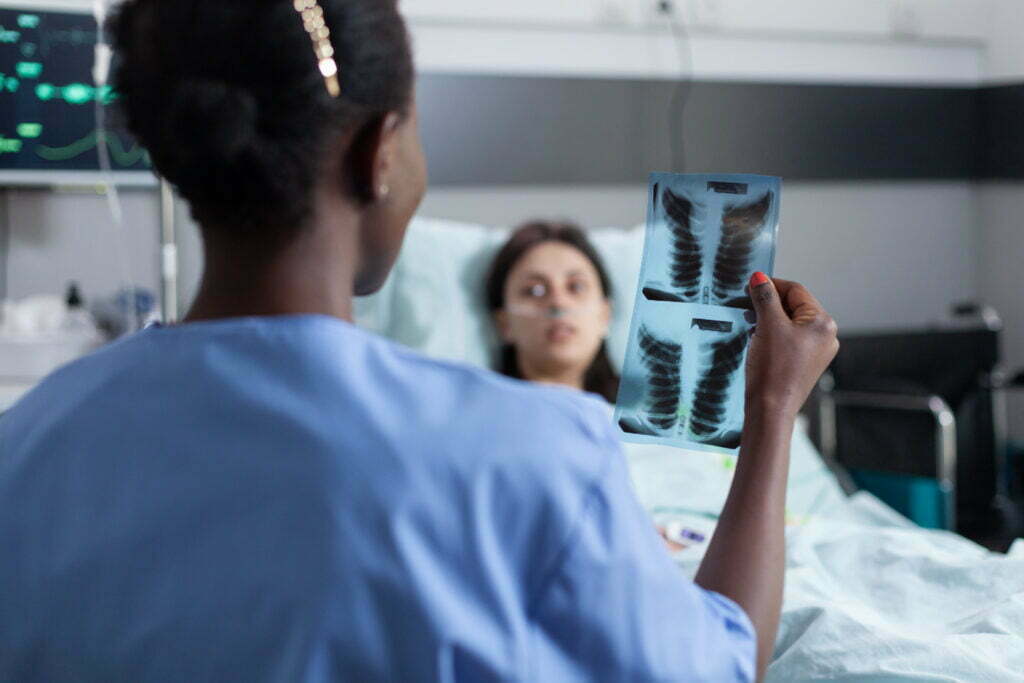Lung disease is a widespread ailment that affects millions of people in the United States and one of the most common lung diseases is chronic obstructive pulmonary disease (COPD).[1] Many areas of a person’s life change when they are diagnosed with COPD. Most of these lifestyle changes are recommended by doctors to help reduce symptoms and complications. Eating is one of the most common areas where healthcare providers focus in order to help patients cope with the disease. However, if the patient has no motivation or knowledge about which foods to eat and which to avoid, their health condition might be at risk.
Emerging telemedicine and remote patient monitoring (RPM) technologies provide opportunities for preventative management of COPD patients at risk of exacerbation using home medical tools like pulse oximeter and spirometer. In our previous article, DrKumo talked about ways to reduce the burden of COPD through RPM. RPM can help patients talk with their doctors and get advice on proper nutrition and diet, exercise, medications, and other treatment plans. Now, let’s talk about some foods to avoid for people with COPD.
1. Fried foods
Grease in fried foods causes digestive issues like the breakdown of fats that takes longer in the digestive system and bloating that takes place in the abdomen. According to the National Emphysema Foundation this side effect of eating fried food turns out to be the cause of pain and breathing difficulties while contributing to weight gain in the patient.[2] When you carry excess pounds, your heart and lungs have to work harder, which makes breathing difficult. Common fried foods that should be avoided are donuts, fried chicken, french fries, and onion rings.
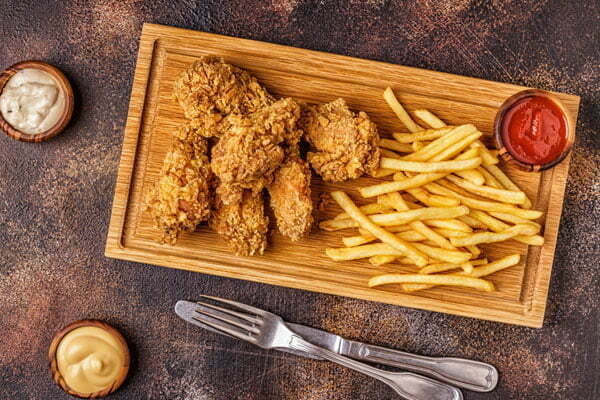
2. Salty foods
Salt is essential to maintaining a healthy sodium balance in the body, but getting too much in your diet can cause your body to hold on to fluids, which can increase your risk of pulmonary hypertension, a common complication of COPD. If COPD patients continue to consume high quantities of salt, they will likely experience trouble breathing as the extra water acts like excess fat when located around the diaphragm. The COPD Foundation suggests choosing foods that are “low sodium” or that have less than 140 milligrams (mg) of sodium per serving.[2]
More sodium or salt in your diet causes water retention that may affect your breathing. Remove the salt shaker from the table and reduce or eliminate the use of salt in your cooking. Instead, you can have unsalted herbs and spices to give flavor to food instead. It could be beneficial if you prepare your own meals at home from fresh ingredients and avoid or limit frozen foods like pizzas, canned soups, veggies, and some salty snacks like crackers, chips, and salted nuts. You can ask or look for ideas from your doctor or clinician about low-sodium salt substitutes.
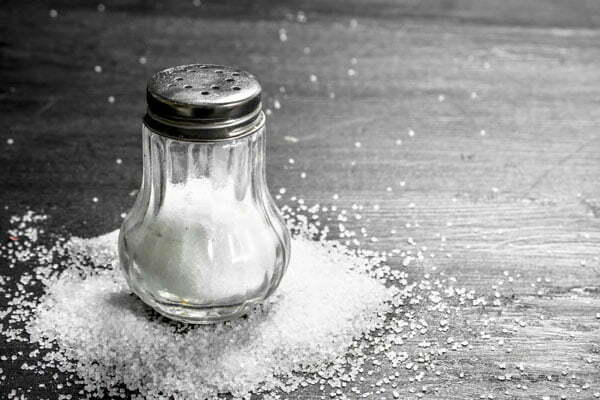
3. Dairy Products
Dairy products are foods that contain the milk of mammals. Some popular dairy products include cheese, milk, yogurt, ghee, butter, cream, and whey. According to the source, dairy products, such as milk and cheese, increase the amount of phlegm or make it thicker.[2] When a person consumes dairy products, a product of the breakdown of milk digestion called casomorphine increases the amount of mucus and phlegm produced. To expel the excess mucus and phlegm, the body generally coughs it out. For patients with COPD, coughing and wheezing can lead to a significant amount of discomfort. Then, it is suggested that dairy-based foods and drinks should be eaten less often.
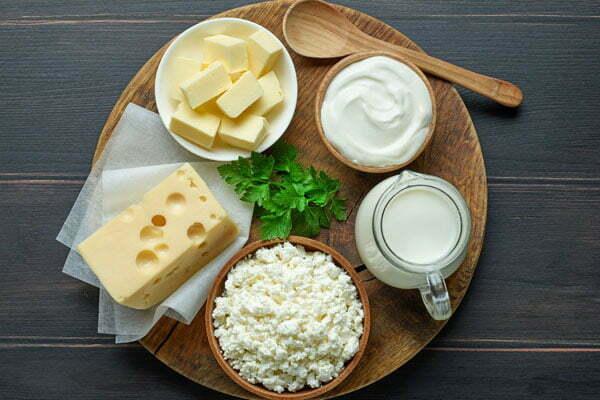
4. Cold cuts and processed meats
According to research, high and frequent consumption of cured meat has been linked to the obstructive patterns of lung function and increased odds and causal risk factors for COPD.[3] Processed meats like bacon, cold cuts, sausages, hot dogs, and lunch meats have preservatives to extend their shelf life. These additives are unhealthy to consume, especially for those living with COPD. People who have lung problems may get worse if they eat a lot of the nitrates in these foods.

5. Cruciferous vegetables
Experts say cruciferous vegetables may be packed with vitamins, minerals, fiber, and antioxidants but can give you extra gas, which can lead to bloating and more restricted breathing.[4] However, chewing your food really well to make sure you are not gulping it down and injecting any extra air may reduce the amount of bloating.
The most common examples cruciferous vegetables are broccoli, cauliflower, cabbage, Brussels sprouts, bok choy, and kale. If you experience being bloated or gassy after eating any of these vegetables but do not want to miss out on the nutritional benefits, you can eat them in a lesser volume or you can swap them with other types of fruits and vegetables.
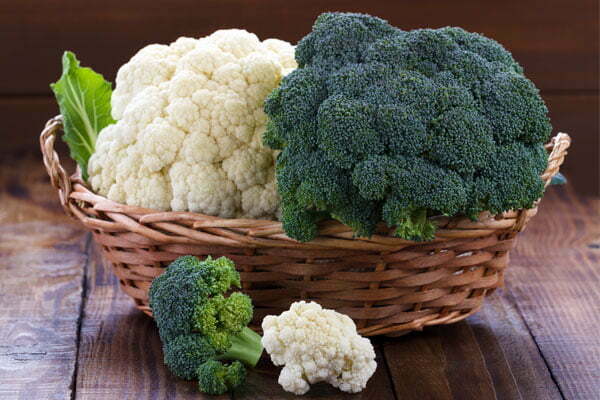
6. Coffee, caffeinated tea, chocolates
According to the director of pulmonary medicine, people with COPD are usually prone to acid reflux due to GERD, also known as gastroesophageal reflux disease, and having both can aggravate your COPD symptoms.[5]
The specific explanation is that when stomach acid backs up into the esophagus, there are cases where it might detour into the lungs, which is known as an aspiration, which can damage lung tissue, trigger coughing and wheezing, and cause a lung infection. Aside from being aware of any potential triggers, certain foods must also be avoided if you are suffering from GERD. These food examples include coffee, caffeinated tea, chocolate, sodas, mint, fried or spicy foods, tomato sauce, and citrus juices.

7. Alcohol and carbonated beverages
Too much alcohol can make your breathing slow and make it more difficult to cough up mucus. Based on an article in the journal Alcohol Research, too much drinking alcohol can impair immune response and has been associated with an increased risk of respiratory infections, including pneumonia, respiratory syncytial virus (RSV) infection, and acute respiratory distress syndrome (ARDS).[6]
Sodas, seltzers, and other carbonated beverages are infused with carbon dioxide, which leads to belly gas and bloating. This increases pressure in the middle of patients’ torsos, which complicates their ability to breathe. To avoid such symptoms, patients with COPD should drink water to allow the body enough fluid to carry out all metabolic activities. The lungs of COPD patients have become more and more hyperinflated. They have become increasingly sensitive to being bloated because it physically impacts their space to breathe. Instead of carbonated drinks, hydrating with water, herbal teas, and non-carbonated juices is advised.

How DrKumo RPM Helps
DrKumo, leader in Connected Health Technology and Disease Management Programs, deploys Real-Time Remote Patient Monitoring Technology Solutions to help COPD patients prevent acute exacerbations and improve medication and treatment adherence. Worsening symptoms of COPD are usually underreported by patients because they cannot recognize changes as contributing factors to a decline in their health condition. DrKumo RPM for COPD enables continuous monitoring of vital signs utilizing AI-powered wearables and other easy-to-use and familiar medical devices such as pulse oximeter and blood pressure monitor.
Takeaway
Eating the right mix of nutrients in your diet has a big role in achieving health goals and quality of life for those living with chronic obstructive pulmonary disease (COPD). Patients COPD mostly experience and carry the burden of irreversible lung damage. Aside from being aware of food factors that will trigger the disease, COPD patients can take small steps to manage their symptoms. It is therefore highly recommended that patients should avoid or limit the foods that can exacerbate their symptom.
In the next article, we will talk about some recipes and good food for people with COPD. For more information about how RPM can help, contact DrKumo.
References:
- FastStats. (2021, April 14). Centers for Disease Control and Prevention. https://www.cdc.gov/nchs/fastats/copd.htm
- BobG. (n.d.). Foods that can irritate COPD. National Emphysema Foundation. https://www.emphysemafoundation.org/index.php/about-uss/privacy/83-copd-emphysema-articles/358-foods-that-can-irritate-copd
- Cured meat consumption, lung function, and chronic obstructive pulmonary disease among United States adults. (n.d.). PubMed.
- Alicia romano, ms, rd, ldn, CNSC. (n.d.). Tufts Medical Center | Boston Hospital and Academic Medical Center. https://www.tuftsmedicalcenter.org/physiciandirectory/alicia-romano
- Jorge M. Mercado, MD. (n.d.). Patient Care at NYU Langone Health. https://nyulangone.org/doctors/1447411970/jorge-m-mercado
- Alcohol’s effects on lung health and immunity. (n.d.). PubMed Central (PMC). https://www.ncbi.nlm.nih.gov/pmc/articles/PMC4590617/
